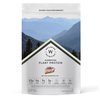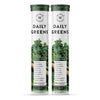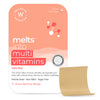Excited about your trip but concerned at the same time? What if my diet and health go for a toss? Following a balanced regimen during travel might seem like an additional task, but when planned well, you will be able to strike a balance.
Whether you're a frequent jet-setter or planning a once-in-a-while trip, maintaining a balanced diet while on the go is crucial for your overall health and well-being. Frequent travel can impact your eating regimen, which, if not balanced well, may put you at risk of deficiencies of essential nutrients, specifically vitamin B12, vitamin D3, and vitamin C. Vitamin B12 is essential for maintaining a healthy nervous system, forming red blood cells, and aiding in DNA synthesis. Vitamin D3 is essential for bone health, immune function, and overall well-being. Vitamin C is a powerful antioxidant that plays a key role in collagen production, immune system function, and wound healing.
Practice clean eating at home
Charity begins at home, and so does eating discipline. If you are used to following a healthy eating routine, it is more likely that you will remember and try to stick to a similar routine while traveling.
Do a background check
Research a little about the place you are heading to. Check out the food options and availability. Many travel websites and apps have such information along with the menu and reviews.
Carry Your Eats
Remember to pack nutrient-rich baked, roasted healthy snacks such as multigrain crackers or khakra, along with dry fruits, nuts, and seeds for fillers. Such snacks not only provide you with essential nutrients but also keep you satiated and prevent you from overeating or indulging in unhealthy snacking.
Pack Some Supplements
Carrying your supplements along, like vitamin B12 strips, natural vitamin C supplements, and vitamin D3 supplements, can also ensure that you do not miss out on your daily dose of vitamin B12, vitamin D3, and vitamin C even when on the go. Some of the best vitamin B12 and vitamin D3 supplements come in thin oral strip form, which contains plant-based ingredients converted into nanoparticles that rapidly dissolve on your tongue to release nutrients in your bloodstream. Do get it approved by your doctor once.
Keep Hydrating
Limiting water intake to prevent frequent bathroom trips during travel can backfire. Hydrating sufficiently is essential to avoid fatigue, headaches, and digestive problems during travel. You can also meet your hydration needs through watery fruits and vegetables like melons, berries, carrots, plums, etc. Along with water, they may be able to provide you with additional nutrients like vitamin A, vitamin C, and vitamin vitamins.
Be Mindful of Your Portion Sizes
The thought of trying different cuisines can get you excited but do not get carried away. The portion size served to you may be larger than what you are used to. Try sharing it with your friends, partner, or family, or ask for smaller portions in such cases. Eating just the right amount of food can save you from consuming excess calories and creating gastric troubles.
Opt for Local Dishes
Most local delicacies are not just full of flavors but also rich in essential nutrients like vitamin C, vitamin D3, and vitamin B12. For example, in some parts, fermented foods like kimchi, sauerkraut, idli, and dosa are common staples that can provide a dose of vitamin B12.
Restrict Indulgences
When on vacation, it can be tempting to binge on alcohol or sugary drinks, but it can have negative consequences for your health. Indulgences in alcohol, sugary beverages, and junk foods can not only deprive you of your essential nutrients like vitamin B12, vitamin D3, etc. but also interfere with their absorption.
Select accommodations with cooking facilities
Having access to the kitchen while traveling can go a long way in helping you stay on track, even during travel. Prepare your own nutritious meals whenever possible and use local and fresh ingredients that will provide you with your daily dose of vitamins and minerals.
Make informed choices
When eating out, select foods that are less processed and low in sodium, sugar, and fat. Go for boiled, baked, grilled, or steamed options over fried ones. Have iced water instead of soda. Stick to low-fat options wherever they are available.
Stop stressing about food
Having shared all of the above tips, it is equally important for you to relax and not stress about eating the right foods each time. Let it come with ease. No binge eating, but no starving as well. Try to eat till you feel 80% full, and then pause and reflect if you need more. This will prevent you from both undereating and overeating.
Wrapping Up
No more disruptions in your healthy regimen during your travels this time. Follow the tips given below to have fun on your trip without compromising your health. Make this trip memorable. Don't let that one week of travel ruin your efforts to maintain good health throughout the year. Preplan your eateries, carry healthy snackables, maintain hydration, limit your portion sizes, pack along essential supplements, restrict indulgences, and opt for local cuisines for adventurous and guilt-free trips.






























 DOWNLOAD NOW
DOWNLOAD NOW
